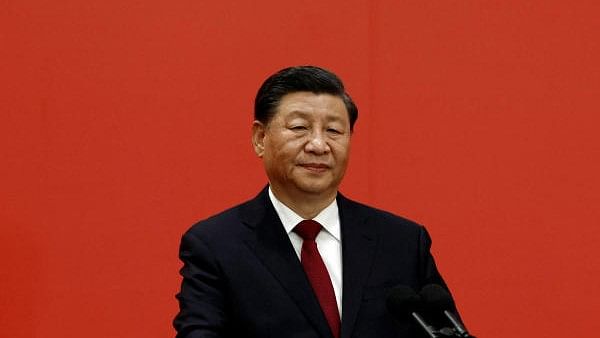
China President Xi Jinping.
Credit: Reuters File Photo
Beijing: China on Wednesday defended its President Xi Jinping receiving the credentials from the official of the Taliban-headed interim government in Afghanistan, saying that it is a “normal diplomatic arrangement” and urged the international community not to exclude the Afghan militant group even though it is yet to respond to global concerns.
Xi on Tuesday received the credentials of ambassadors from several countries, including from Bilal Karimi, the Taliban-appointed Afghan ambassador in what was termed the first diplomatic recognition of the Taliban government in Kabul, which is yet to get official recognition internationally.
“It’s a normal diplomatic arrangement for China to receive the new ambassador to China sent by the Afghan interim government and for him to present his credentials to the Chinese leader,” China’s Foreign Ministry spokesman Wang Wenbin told a media briefing here on Wednesday.
When asked to state clearly if the move amounts to recognition of the Taliban government, he said, “You asked whether China officially recognises the Afghan interim government? I would like to say that China believes that Afghanistan should not be excluded from the international community.”
China is committed to a foreign policy of friendship towards all Afghan people and has maintained diplomatic ties and exchange and cooperation in various areas with Afghanistan, Wang said.
“We hope that the international community will step up engagement and exchange with the Afghan interim government, encourage it to actively respond to international concerns, jointly help with Afghanistan’s reconstruction and development, and support Afghanistan’s effort to combat violent terrorist forces and contribute to regional peace, stability and prosperity,” he said.
Without referring to the global concerns over the Taliban’s ban on women's education and work and its disinclination to share power with other political groups in the war-torn country, Wang said China hopes Afghanistan will further respond to the expectations of the international community.
Meanwhile, Zabihullah Mujahid, the Taliban's chief spokesperson, on Tuesday said, "China has understood what the rest of the world has not." "We are not in a unipolar world," he posted on X, while calling on Russia, Iran and other countries to take similar steps and upgrade bilateral diplomatic relations with Kabul.
According to the state-run Xinhua news agency, Xi told the new ambassadors that China is seeking deep friendship and mutually beneficial cooperation with their countries.
Matthew Miller, spokesperson for the US State Department, said whether Beijing has officially recognised the Taliban regime is for Chinese officials to clarify.
"I have seen some comments from them to the contrary," Miller told Voice of America (VOA) on Tuesday. For the US, Miller said, the Taliban's relationship with the international community depends on their actions.
"China may be getting ready to break ranks and take the final technical step either within the UN system or outside of it through a bilateral initiative," Omar Samad, a former Afghan ambassador was quoted as saying by VOA.
China along with Pakistan and Russia maintained its embassy in Kabul after the Taliban took control of Afghanistan in August 2021, following the withdrawal of American troops from the country.
Significantly, China’s diplomatic recognition of the Taliban government comes at a time when Pakistan, Beijing’s all-weather ally, is having serious problems with the militant group that it once nurtured.
Pakistan is now blaming the Taliban government for recurring terrorist attacks in the country and criticised it for not cracking down hard on Pakistan Islamic militant groups operating from Afghanistan.
In retaliation, Pakistan has ordered forceful evacuation of thousands of Afghan refugees living in the country for decades.
While China's recognition marks a significant step, it remains an isolated one. No other major nation has recognised the Taliban's 'Islamic Emirate of Afghanistan', and the UN has repeatedly denied their requests for representation at the world body, the VOA report said.
The US and the EU have imposed economic and political sanctions on Taliban leaders and entities, accusing them of grave human rights violations, particularly concerning women's rights to education and work.